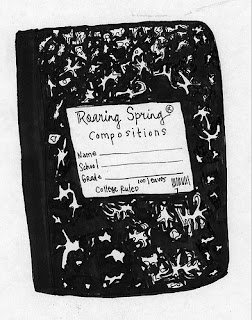Students will practice borrowing writing ideas from a professional writer.
ROUTINES & RITUALS REVIEW
- Date each entry.
- Write on both sides of the page.
- DO NOT tear out pages.
- Enter a title & date for each entry on the Table of Contents pages.
1. You get ideas for writing from making connections to your reading.
 2. Read Aloud/Think Aloud: I read "My Name" from The House on Mango Street by Mexican-American author Sandra Cisneros and relate it to my name's history. By modeling my story, students get an idea of the methods they should use when thinking about how to borrow an idea from a professional writer.
2. Read Aloud/Think Aloud: I read "My Name" from The House on Mango Street by Mexican-American author Sandra Cisneros and relate it to my name's history. By modeling my story, students get an idea of the methods they should use when thinking about how to borrow an idea from a professional writer.Here's an excerpt from "My Name":
In English my name means hope. In Spanish it means too many letters. It means sadness, it means waiting. It is like the number nine. A muddy color. It is the Mexican records my father plays on Sunday mornings when he is shaving, songs like sobbing.YOUR WRITERS NOTEBOOK
It was my great-grandmother's name and now it is mine. She was a horse woman too, born like me in the Chinese year of the horse--which is supposed to be bad luck if you're born female-but I think this is a Chinese lie because the Chinese, like the Mexicans, don't like their women strong.
- Open your writer’s notebook to your WRITING EXPLORATIONS area
- Either go to the next page or skip 2 lines
- Write today’s date on the left.
- Begin a new entry titled, “My Name”, “My Friend’s Name” or “My Partner’s Name” OR make up your own title (i.e. “My Name or How Malcolm Little became an X”)
- Be sure to post this in your Table of Contents and look at the Blackboard to ensure you are doing the activity correctly.

When you quick write, you:
- Write It! Write to get your ideas on paper.
- Get Free! Let the thoughts flow.
- Imperfection is a part of the perfecting process! Making mistakes and learning from those mistakes leads to perfection.















